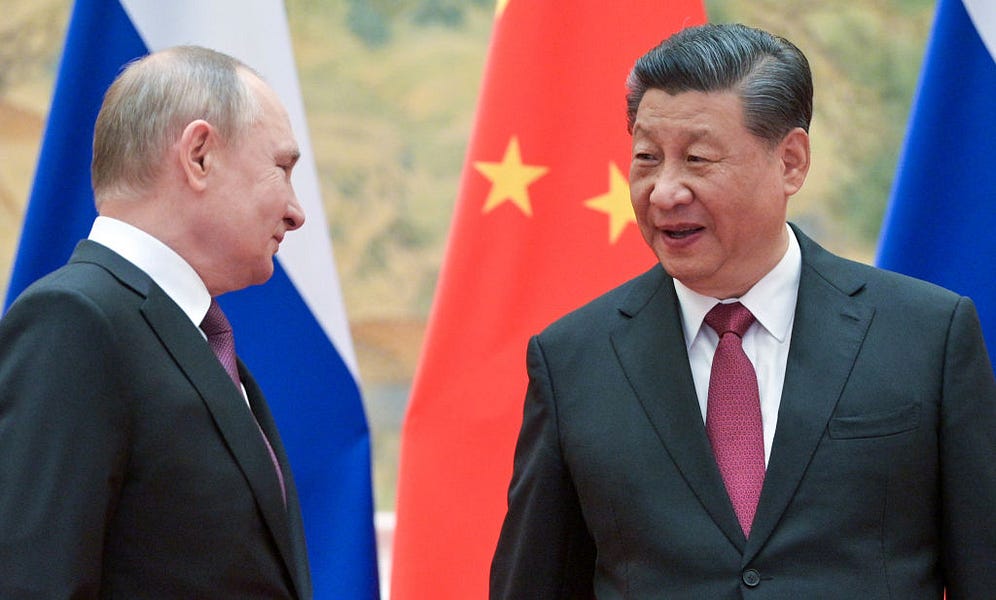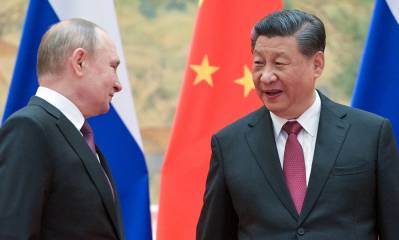On February 4 China and Russia issued a joint statement on “the International Relations Entering a New Era and the Global Sustainable Development.” This ponderous document announces a cooperative Sino-Russian relationship in everything from China’s Belt and Road development project to opposing Japan’s plans to release contaminated water from the Fukushima plant. The most significant change the document announces is that China now formally opposes NATO enlargement (a notable position for China, which is nowhere near the North Atlantic).
The joint statement could be interpreted as a permission slip from China to Russia for a further invasion of Ukraine. Pentagon press secretary John Kirby called it“further evidence that China has decided that they're going to stand alongside Russia with respect to what's going on in Europe.” The statement is certainly designed to be a very public sign of a solidifying anti-U.S., anti-liberal alliance between the second and third most powerful states on Earth. One section of the joint statement, toward the end, has been mostly ignored, but it touches on how Russia’s propaganda campaign against the West is about far more than Ukraine, and will last longer than any invasion. The paragraph is a sign of a rebirth of one of the weirdest episodes of the late Cold War: a massive Communist disinformation campaign to accuse the U.S. of secretly creating some of the worst pandemics. Here is the relevant passage
“The sides [China and Russia] emphasize that domestic and foreign bioweapons activities by the United States and its allies raise serious concerns and questions for the international community regarding their compliance with the BWC [Biological Weapons Convention]. The sides share the view that such activities pose a serious threat to the national security of the Russian Federation and China and are detrimental to the security of the respective regions…”
What kind of domestic and foreign bioweapons activities is this referring to? America has no biological weapons program, and the idea that the U.S. would conduct sensitive clandestine bioweapons research overseas would be preposterous, for security reasons alone. I spoke with Milton Leitenberg, an expert in Soviet and Russian biological warfare and biowar-disinformation, about this part of the joint statement. He told me that this paragraph is 1) extremely important, 2) unprecedented, and 3) absolutely and totally untrue. He added that he has no doubt at all that Putin and Xi know that it is untrue. Unlike some other kinds of Russian and Chinese propaganda, Leitenberg is certain that Putin’s and Xi’s intelligence agencies know that these accusations are all complete fabrications.
During the last decade of the Cold War, some enterprising KGB officers who worked in “active measures” (a kind of Soviet black propaganda) came up with the idea of blaming the U.S. government for AIDS, then a mysterious and alarming new disease. They “broke” the story that AIDS had been secretly manufactured at Fort Detrick in Maryland via an Indian newspaper they controlled. The Soviets subsequently spread this story through a sustained propaganda campaign. This eventually became a joint Soviet-East German-Bulgarian disinformation operation known to the Stasi as “Operation Denver” that one former KGB archivist wrote was “Probably the most successful anti-American active measure of the Gorbachev era.”
The campaign ended when the Cold War ended, but under Putin’s rule the old lies were brought back in full force. The old Soviet narrative was updated with some relevant paranoia-hooks related to U.S. efforts to actually reduce the risk of some of the USSR’s extensive and illegal biological weapons program from falling into the wrong hands. Starting in the 1990s the U.S. funded upgrades and staff training for many former Soviet biological research facilities, replacing obsolete equipment, bringing them up to world standards, and helping ensure they are valuable contributors to global biosecurity efforts instead of being potential risks. Russian propaganda has accused the U.S. of conducting secret biological weapons research in “200” of these former-Soviet facilities, and has especially fixated on the Lugar Research Center in Tbilisi, Georgia, named after former U.S. Sen. Richard Lugar.
Zany as it may sound to our ears, this conspiracy theory is now a standard part of the Russian anti-U.S. repertoire. China, on the other hand, did not participate in the Soviet AIDS disinformation campaign (it began while the USSR and Communist China were bitter enemies), nor did it participate in the earlier post-Soviet iterations of anti-American bio-disinformation spread by Russia. This changed in the spring of 2020, just as the world was getting hit with a mysterious virus coming out of China. The new Chinese campaign is an obvious plagiarism of the Russian one, referencing slanders that the U.S. was creating designer diseases that targeted certain ethnic groups, attacking the Lugar Center in Georgia, and even reusing the bogus statistic that there are 200 U.S. “military biological laboratories across the world.”
As documented in the extensive appendix of a recent paper by Leitenberg, this was not a one-off messaging push to distract from accusations that COVID-19 may have escaped from a Chinese lab in Wuhan, but the start of a massive and sustained new Chinese effort to harm the reputation of the U.S. The campaign has included statements from Chinese Foreign Ministry spokesmen and extensive coverage in Chinese state-controlled media.
This small passage of the joint Sino-Russian statement may herald a new era of disinformation cooperation between China and Russia. Russia’s long experience in generating and disseminating extremely effective disinformation narratives will be combined with China’s greater financial resources and potential reach in order to pump this bio-disinfo lie into even more minds. The lie that the U.S. is conducting dangerous biological warfare experiments on Ukrainian soil is a standard part of the pro-Russian repertoire in that country, and the idea dovetails with related narratives that Ukraine is controlled by America and so does what it will with the locals. We should expect these ideas to crop up more in countries that are critical to Communist Chinese interests: Taiwan, Japan, the Philippines, Vietnam, South Korea, etc.
These kinds of disinformation campaigns can even have an effect in the U.S. A Health and Human Services study of American attitudes found that as of 2003, 34 percent of blacks, 21.9 percent of Hispanics, and 8.4 percent of whites believed that AIDS is “the result of a government plan to intentionally kill a certain group of people by genocide.” That adds up to millions of American citizens who believed an incredible libel against their own government. If it were true that the U.S. government did such terrible things then covered them up, what would be the appropriate response?
The COVID pandemic has put the issue of bio-security at the forefront of politics. We have spent two years focused on new viruses, lab leak theories, and accusations about government involvement in creating or exacerbating or neglecting the massive disaster we are still experiencing. Chinese and Russian propagandists can take advantage of this opportunity to jointly propagandize the idea that the U.S. is behind COVID, AIDS, and any other disease that they like. This disinformation will obfuscate investigation into the possible origin of COVID in a Chinese lab, provide PR cover and whataboutism-ammunition for secret Chinese and Russian biological weapons programs, and increase distrust of the U.S. government among U.S. and foreign peoples, leading to less cooperation, more social friction, and even helping to justify “striking back” at a government that is supposedly secretly responsible for millions of deaths.





Please note that we at The Dispatch hold ourselves, our work, and our commenters to a higher standard than other places on the internet. We welcome comments that foster genuine debate or discussion—including comments critical of us or our work—but responses that include ad hominem attacks on fellow Dispatch members or are intended to stoke fear and anger may be moderated.
With your membership, you only have the ability to comment on The Morning Dispatch articles. Consider upgrading to join the conversation everywhere.